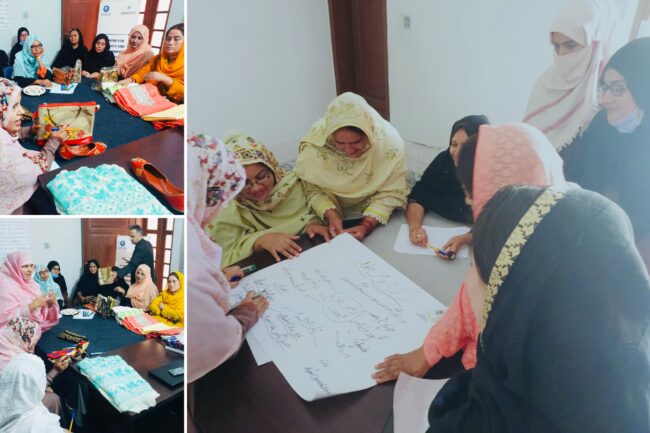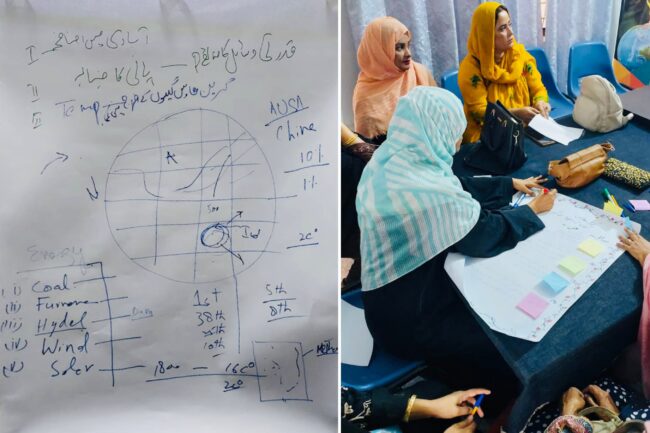Think globally, act locally! By integrating SDG 5: Gender Equality and SDG 12: Responsible Consumption and Production, Kaarvan has created a coalition with relevant institutions such as UN Women Pakistan, British Asian Trust, IAC, CCER (Center for Climate and Environmental Research), LUMS, UMT, Empowering Women, Public Space, and Climate Change—to address the complexity of climate change and its interconnections with rural women’s work, craft, and consumerism. Together, we are unlocking indigenous community practices, becoming more intentional about the consumption of resources, and creating new economic, environmental, and social models.
On October 4, 2023, Kaarvan and the Centre for Climate and Environmental Research (CCER), an autonomous research and development think tank under the Institute for Art and Culture (IAC), held a participatory workshop on Engaging Communities for Climate Action: Assessing Needs and Challenges.
Dr. Muhammad Arfan and Sami Naeem Khan Senior Research Fellows engaged with a group of rural women entrepreneurs from Multan to raise awareness about the phenomenon of climate change and how individual actions affect weather patterns. “The connection of these women to a wider ecosystem caught me off guard. Most of the time, the public is in denial of their carbon footprint or simply their human impact on the climate. Here, in Multan, these women were understanding of the human impact on the consumption of resources, be it oil, gas, electricity, or water—how it is interconnected with the extreme weather crisis we are experiencing these days,” shares Dr. Muhammad Arfan. Through the Causal Loop group activity, rural women reflected on the cause and effect of their relationship with the environment.
 CCER shed some light on the fashion industry’s impact on the environment by sharing statistics from the World Bank showing that the fashion industry’s global greenhouse gas emissions have reached staggering levels, surpassing even the combined emissions of international flights and maritime shipping.1 If the industry maintains its current trajectory, projections indicate that by 2050, it could consume more than 26% of the carbon budget linked to the 2°C pathway. That’s a quarter of the world’s carbon budget solely attributed to the fashion industry.2 These emissions are generated across every phase of the supply and value chain, spanning raw material production, processing, assembly, logistics, and even customer product care and disposal at the end of its life cycle.
CCER shed some light on the fashion industry’s impact on the environment by sharing statistics from the World Bank showing that the fashion industry’s global greenhouse gas emissions have reached staggering levels, surpassing even the combined emissions of international flights and maritime shipping.1 If the industry maintains its current trajectory, projections indicate that by 2050, it could consume more than 26% of the carbon budget linked to the 2°C pathway. That’s a quarter of the world’s carbon budget solely attributed to the fashion industry.2 These emissions are generated across every phase of the supply and value chain, spanning raw material production, processing, assembly, logistics, and even customer product care and disposal at the end of its life cycle.
In this context, rural microentrepreneurs began to draw up dynamic causal loops, identifying behaviours and understanding their global implications—how to break the habit of waste. Together, the women envisioned a landscape that is toxin-free; renewable materials are both conceived and manufactured within a circular and waste-free framework. Discussion on increasing population and depletion of finite resources led to jotting down points of how to counteract the negative behaviours of global deforestation with local actions of harvesting crops and trees in their neighbourhood; mindful water consumption through an efficient irrigation system; utilizing public transportation and carpooling to cut back on carbon emissions; availing alternative energy resources of solar, wind, and hydro over coal and oil; and reducing the burning of materials that increase pollution, smog, and are hazardous to health.
Young and energetic microentrepreneur Amina Adnan dove deep into the heart of causal loops, tracing individual actions to environmental impacts.
“I truly believe this high-level training is needed in business to create a healthier, more sustainable future. It is important to know how we can be more climate-friendly to safeguard the future for our business, ourselves, and our family. I learned that many materials we utilize are not climate-friendly, and after the session, I have tried to decrease my use of such tools and materials. Sensitivity towards waste has always been inculcated in all the program trainings, even during Uraan Market Linkages events and exhibitions where paper bags are used instead of plastic bags. I have begun to adopt this practice of using paper or cloth bags in my own business. This ensures that waste is biodegradable. I try to recycle as much as I can. This helps with waste management and control. I believe such awareness sessions oriented towards action are essential, and everyone should be exposed to them. I was always interested in this topic and did my own research on the environment and its interconnections with social impacts. As members of the community, we play a vital role in conserving our future. The elders said that as time goes on, winters will become shorter. Now, through this workshop, we have found the scientific reason. As long as we are not responsible, the climate will continue to elude us; the weather will become more extreme, and our bodies will fall prey to sickness and viruses similar to COVID.”
The future of the textile industry depends on innovation. “From this introductory session, I have become much more cognizant of wasting materials and how to recycle effectively. Now, I am making an effort to utilize the leftovers from the kitchen for fertilizer and reduce waste,” relayed microentrepreneur Ruzina Jamil.
Another microentrepreneur, Farhana Jabeen, echoed similar sentiments about learning the tactics of conversation about gas and water. She went further to say that her key takeaway was the concept of upcycling, and that she is now collecting pieces of fabric leftover from her hand embroidery products and is in the process of making patchwork bags from the scraps.

“We are just beginning to reckon with this notion of climate change and its effect on future generations. We need more knowledge on how to be conscientious citizens of our planet that we can practice individually and share with the wider community for collective change,” says microentrepreneur Yasmeen Kousar. Indeed, knowledge acts as our primary tool for understanding and addressing the complexity of climate change. Awareness fuels the drive to make a difference and encourages individuals to contribute to everyday actions that can make a significant difference. What we make, buy, wear, and value shapes and responds to our intentions in crucial and meaningful ways.
1 The World Bank (2019), “How Much Do Our Wardrobes Cost the Environment?”. The World Bank.
https://www.worldbank.org/en/news/feature/2019/09/23/costo-moda-medio-ambiente
2 Ellen MacArthur Foundation (2017), A New Textiles Economy: Redesigning Fashion’s Future.
https://www.ellenmacarthurfoundation.org/a-new-textiles-economy
